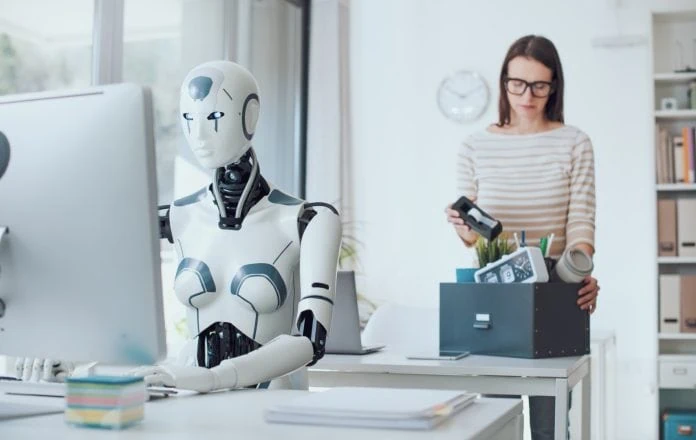Concerns about artificial intelligence replacing human jobs are growing, but several professions are safe from automation for the foreseeable future.
For instance, roles in agriculture, environmental sectors, and social services take time to automate. These jobs remain secure and in demand, illustrating that AI’s impact on employment isn’t entirely threatening.
This article will delve deeper into these professions and the influence of AI on the job market.
Highlights
- ? AI cannot replace several jobs due to the need for emotional intelligence, creative reasoning, and human touch.
- ? Agricultural roles, education, human resources, healthcare, legal positions, and others require human skills such as empathy, emotional intelligence, and adaptability, which AI cannot provide.
- ? Creative and artistic professions like writing, music, and graphic design are safe from automation as AI lacks genuine creativity and the human touch.
- ? Specialized skills like carpentry, plumbing, welding, and baking require precision and human interaction, making them difficult for AI to replicate.
- ? While AI can enhance certain processes, jobs that require human skills and emotional nuances remain largely secure from automation.
What Jobs AI Currently Can’t Replace
You may be surprised to discover the many jobs AI can’t replace, at least not anytime soon. Agriculture, education, human resources, law, government, healthcare, software, IT and data services, creative industries, human resources, law, sales and customer service, social work and counseling, research and development, and even entrepreneurship and innovation are all examples of roles that require human touch and emotional intelligence that AI is unable to provide.
Agricultural roles need physical manpower, and supply chains are shortening with direct-to-consumer selling. In education, soft skills like empathy, leadership, and active listening are necessary for students to grow into well-rounded individuals.
HR decisions are too important to be left to algorithms, and lawyers need negotiation and critical thinking skills to navigate complex legal systems. Healthcare relies on human interaction, while software engineers and developers are in high demand (including for AI development).
Creative industries are relatively safe from automation, and computers can only automate a small percentage of tasks. AI is used in HR for functions like recruitment, but humans are still needed for decision-making. In law, AI tools are primarily used for paralegal work, and sales and customer service require human interaction and empathy.
Social work and counseling are impossible to automate, and research and development demand creative problem-solving. Entrepreneurship and innovation also require human creativity and adaptability.
The list goes on and on, proving that AI may be able to assist in some areas, but it can only replace the human touch or the essential skills needed in some jobs.
Why AI Can’t Replace Certain Jobs
You may be surprised to discover the many jobs AI can only replace for a while. From healthcare and education to software and social work, AI cannot provide the emotional intelligence, creative reasoning, and human touch necessary for specific job roles.
Healthcare, for example, requires high emotional intelligence to diagnose illnesses and create treatment plans, while teaching relies on adapting to students’ needs. Software engineers and developers are in high demand as digital transformation is necessary for businesses to stay competitive.
In the creative industries, AI’s current limitations in generating original ideas and copyright issues protect creatives from automation. Human resources departments also require a human with empathy and interpersonal skills. AI is being introduced alongside HR processes to assist in repetitive tasks but can’t replace the human touch.

In the legal sector, AI algorithms lack human cognition and problem-solving abilities. At the same time, lawyers require negotiation, strategy, and critical thinking. Government workers and politicians need creative reasoning, compassion, and teamwork to address issues, and machines can’t provide the human touch necessary for effective governance.
Similarly, sales and customer service roles require human interaction and soft skills to understand customer needs and build relationships. Social work and counseling rely heavily on human empathy and emotional intelligence; machines can’t replicate the human connection required in these fields.
AI algorithms are complex and can assist with many tasks, but humans are still needed in many job roles. Machines can’t provide the emotional intelligence, creative reasoning, and human touch necessary for certain professions, and they likely will be able to replace these jobs sometime soon.
Examples of Jobs AI Can’t Replace
From human interaction and empathy-centric jobs to creative and artistic professions, complex decision-making and critical thinking jobs to leadership, management, and human resources, AI can only replace the narrow range of specialized skill and physical dexterity jobs.
Let’s take a closer look.
Human Interaction and Empathy-Centric Jobs
With the need for human interaction and empathy continuing to be essential in many areas, these are just some of the jobs AI won’t be replacing anytime soon:
- Agricultural and environmental jobs
- Education and training jobs
- Human resources
- Legal and judicial jobs
- Government and political jobs
- Healthcare
- Education
- Software, IT, and data services
- Creative Industries
- Human resources
- Law
- Sales and customer service
- Social work and counseling
- Research and development
- Entrepreneurship and innovation
These jobs all require human skills such as empathy, emotional intelligence, critical thinking, interpersonal and negotiation skills, and the ability to create art. AI can assist with specific tasks but can’t replace the high emotional and cognitive demands of these jobs.
Creative and Artistic Professions
Although you may not expect it, creative and artistic professions are some of the jobs AI will be replacing sometime soon. AI lacks the human touch and creativity needed in writing, graphic design, music, and photography. Generative AI technologies are still far from replicating the creative processes of these professions. Robotics are also limited in producing creative work, as algorithms still cannot generate original ideas, and copyright issues are a barrier. Machines can automate a small percentage of tasks, but they cannot replace the human touch when it comes to creative and artistic jobs.
Complex Decision-Making and Critical Thinking Jobs
Two of the most complex decision-making and critical-thinking jobs that AI won’t replace anytime soon are healthcare and legal roles.
In healthcare, effective treatment plans rely on human interaction and soft skills.
Legal roles require negotiation, strategy, and critical thinking to navigate complex legal systems. AI can never replace the human touch these roles always need.
Other roles AI won’t replace include software engineering, IT/data services, creative industries, HR, research/development, entrepreneurship, and social work/counseling.
Machines can only automate a small percentage of these tasks, so job security in these fields is higher than average.
Leadership, Management, and Human Resources
AI can’t replace the human touch regarding leadership, management, and human resources roles. These roles require interpersonal skills, empathy, and emotional intelligence—skills machines simply can’t replicate. Investment in human skills is essential for these positions, as AI can only automate a small percentage of the tasks.
Human resources departments need a human touch to ensure their clients’ best interests are upheld. Even though AI can be trained in law, it lacks the critical thinking and negotiation skills that lawyers need. Government workers and politicians also need creative reasoning, compassion, and teamwork to address complex issues.
AI may assist in repetitive tasks but can’t replace the human element. Investing in these essential skills and abilities is the only way to ensure these roles remain secure.
Specialized Skill and Physical Dexterity Jobs
Interestingly, specialized skill and physical dexterity jobs are examples of positions AI cannot replace. Take carpentry, for example. It requires a human touch, time, and skill investment to make things come together.
Similarly, plumbing, auto mechanics, and electrical engineering require fine motor skills and a precise eye to diagnose and repair. These jobs require a human touch that AI isn’t capable of.
Other examples of jobs AI can’t replace include welding, painting, and baking. These jobs require a certain level of precision and a human touch that AI simply can’t replicate.
While AI can help automate specific processes, it can’t replace the time and skill investment a human can provide.
Agricultural Professionals
You may be surprised to learn that agricultural professionals are examples of jobs AI cannot replace. These roles are essential to the industry and require physical labor. Generative AI will never be able to replace the human touch needed in these roles. The need for agricultural professionals will only increase as the agrarian industry shortens its supply chains.
Agriculture technology is growing rapidly, so agricultural professionals must continually upskill to stay ahead. AI can assist in some tasks, but it won’t be able to replace the need for human workers anytime soon. The human touch is still essential for a thriving agricultural industry.
The Impact of AI on Human Employment
How can AI affect human employment in the future?
AI technology has the potential to revolutionize the job market. Still, it’s essential to understand what jobs it can and can’t replace.
Jobs that require human skills that AI can’t replicate, including emotional intelligence, empathy, creativity, problem-solving, and interpersonal skills, have a very low chance of being replaced anytime soon.
AI could make processes more efficient but won’t replace the people at the helm. Those jobs that require human skills and creativity remain safe from automation.





